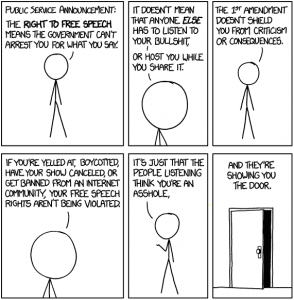The recent Harper’s Letter and Bari Weiss’ resignation from the New York Times have everybody talking about how cancel culture, and the Left in general, are endangering free speech. These next two posts are about why that’s fucking stupid. I’m going to try and approach things solely from the perspective of a classical Liberal in this first post, and get into some of the free speech issues that leftists are concerned with in my next.

First of all, what is the right to free speech in the first place? The text of the First Amendment states the following: “Congress shall make no law … abridging the freedom of speech, or of the press”. Now, strictly speaking, this doesn’t even forbid the states from making such a law, it just says Congress can’t—but obviously no one is gunning for that interpretation. The gist that most of us (including me) accept and support is that the government, at whatever level, has no right to punish anyone for expressing their beliefs. 1
But this is a legal matter. It does not apply to non-government institutions or social mores; it isn’t designed to. Colleges, businesses, charities, religious organizations, and so forth frequently have codes of conduct, including codes of permissible speech, that not only employees but even patrons may be expected to abide by, and these are not infringements of the constitutional right to free speech, because these organizations aren’t the government. A few years ago, when the new hotness was Milo Yiannopoulos getting blackballed from speaking events at colleges, I was still a classical liberal, yet I had no objection to what was happening. Why? Because neither he nor anyone else has a right to appear at a private institution and give a lecture. He’s free to express his views, but he does not have the right to demand that another person or institution host those views. We might think it’s shitty or hypocritical or cowardly for a college to make such a refusal, since they’re supposed to be about free inquiry—but being shitty or hypocritical or cowardly is not, in itself, relevant to the free speech issue. And when we come to things like social media platforms of publications, they have posting standards and content guidelines; they always have. You can’t post porn on YouTube; you can’t tell people to kill themselves on Twitter (not in theory, anyway); the New York Times, even at its free-speechiest, isn’t likely to publish an op-ed advocating the right for adult men to have sex with preteen boys. The people who own those platforms don’t owe you the use of them. Hell, they can ban you if you violate their rules egregiously or persistently enough. Everyone has a right to free speech, but nobody has an inherent right to a megaphone. If you want a megaphone, and you can’t persuade anybody to let you use theirs, then buy one yourself.
Now, when we’re talking about something like social media or print publication, telling somebody to “buy their own megaphone” by designing their own social media platform or founding their own publishing company is obviously pretty prohibitive. It takes a lot of money to do those things, which means that only powerful people (which usually means the rich here), or people backed by the powerful, are likely to be able to. Which results in practical limits on the principle of free speech. But is that the public’s problem? Is the state responsible to promote your voice as well as protect it? A classical Liberal would certainly say “No” to both questions. A leftist might say the same, but they’d also draw attention to the way this illustrates how wealth and power influence our ideas and our culture—points of analysis I’ll be returning to in my next.
But above all, the obnoxious thing about the Harper’s Letter, and Bari Weiss’ resignation post, and in fact most complaints about cancel culture, is that being criticized is not being silenced. I am not the first person to note the irony that the signatories of the Harper’s Letter include some of the most successful, prominent writers in the English-speaking world, from Malcolm Gladwell to J. K. Rowling. Yeah, the left-wing cancellers have really ruined you guys—no one will publish you or employ you or even let you use your Twitter account, with all their … telling you you’re wrong. That’s what a censorship is, right? It’s when people say you’re wrong?

I don’t mean to minimize the real harm that targeted harassment can do. I’ve been harassed online myself, and it can take a real toll on your mental health. But most complaints made against “cancel culture”—aside from some I’ve seen made by leftists who explicitly support deplatforming problematic views as a legitimate tactic—are so vague that it’s difficult to take them seriously, especially when you set them beside the things that these people were being criticized for in the first place: for example, Bari Weiss’ decision to publish Tom Cotton’s2 infamous op-ed, which advocated the government using military force against its own citizens. But to deal with that contrast adequately, we’re going to need to get into some leftist shit …
1 Even this summary is oversimplified; the right to free speech doesn’t mean you can always express your beliefs in any way you want: for instance, if I were to express my belief that health care should be universal by marching into the House of Representatives, standing on the Speaker’s desk, and yelling at the assembled Congresshumans with a lot of swearing (to nick an example from Philosophy Tube), I’d expect to be shown out with extreme prejudice. Obscenity and incitements to violence are also commonly restricted forms of speech, depending on jurisdiction and context.
2 I honestly still cannot believe his name is Tom Cotton. Tom Cotton. Surely he has a brother-in-law named James Crow.












